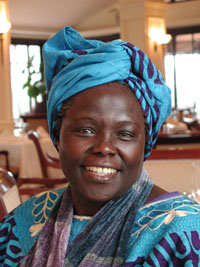
Welcome to the ezine produced by SGI Buddhists that prompts the positive, kindles the constructive, highlights the hopeful and leaves you feeling - well, up!


'Every one of us can make a contribution,' says Nobel Peace Prize winner Wangari Maathai. 'And quite often we are looking for the big things and forget that, wherever we are, we can make a contribution.'
By Geraldine Royds. Photograph by Martin Rowe
'Sometimes I tell myself, I may only be planting a tree here, but just imagine what's happening if there are billions of people out there doing something. Just imagine the power of what we can do.'
Professor Wangari Maathai is Africa's foremost environmental campaigner, internationally recognized for her commitment to democracy, human rights and sustainable development. In 2004, she became the first African woman to be awarded the Nobel Peace Prize, the latest distinction in an accomplished 30-year career.
She was born in Kenya in 1940 and has three grown-up children. After studying in the United States in the early 1960s, Maathai returned home to become the first East African woman to earn a PhD and the first woman in Kenya to head a university department. When her former husband ran for parliament, she became involved in organising work for poor people. When she divorced her husband in the 1980s, he is said to have remarked that she was 'too educated, too strong, too successful, too stubborn and too hard to control,' but Wangari had found her voice.
In the 1970s she became concerned about deforestation. As land was cleared for crops and trees cut down for firewood, the topsoil washed away bringing desertification. With scarce animal feed, little wood for cooking fires and water pollution there was increasing malnutrition and disease. Wangari Maathai decided to solve the problem by planting trees and in 1977 she founded the Green Belt Movement.
She began by encouraging local women's groups to plant trees on farms. The women gathered seeds from the forest and nurtured seedlings in backyard nurseries. When the seedlings were ready, they were given away to local farmers. The women were paid to follow-up and make sure the trees were being taken care of, which brought much needed income into the family.
Her tree planting campaign was not at all popular when it first began. 'It took me a lot of days and nights to convince people that women could improve their environment without much technology or without much financial resources,' says Wangari.
As the trees matured, they provided firewood, animal fodder and fruits as well as additional income through the sale of timber. The improved soil led to better food productivity and the wood provided fencing and building materials. As people saw the benefits of planting trees, Green Belt workers were able to introduce land management practices such as composting and using indigenous crops.
'And then the other very important program has been education. Until people understand the linkages between environmental degradation and their own problems, people become trapped, and they feel disempowered, they feel like they can't do anything, they get overwhelmed by the problems,' explains Wangari.
The movement grew into a powerful force for social and political change, raising awareness about environmental conservation, promoting women's rights and conducting campaigns against human-rights abuses and poor governance. Wangari received death threats, was repeatedly arrested, and once was beaten unconscious by police. Several of her colleagues were killed and the Green Belt Movement was nearly outlawed, but she was unbowed.
Since 1977, the Green Belt Movement has mobilised over 50,000 Kenyan households to plant more than 20 million trees across the country and inspired similar movements in other African countries. The Billion Tree Campaign, an initiative launched by Wangari Maathai and supported by governments and communities all over the world, reached its goal of planting one billion trees worldwide in 2007.
On accepting the Nobel Peace Prize in 2004, Professor Maathai said 'I believe the Nobel committee was sending a message that protecting and restoring the environment contributes to peace; it is peace work. That was gratifying. I always felt that our work was not simply about planting trees. It was about inspiring people to take charge of their environment, the system that governed them, their lives and their future.'
There are many ways to contribute to the Green Belt Movement or the United Nations Billion Tree Campaign spearheaded by Professor Maathai.
To find out more go to http://www.greenbeltmovement.org/

